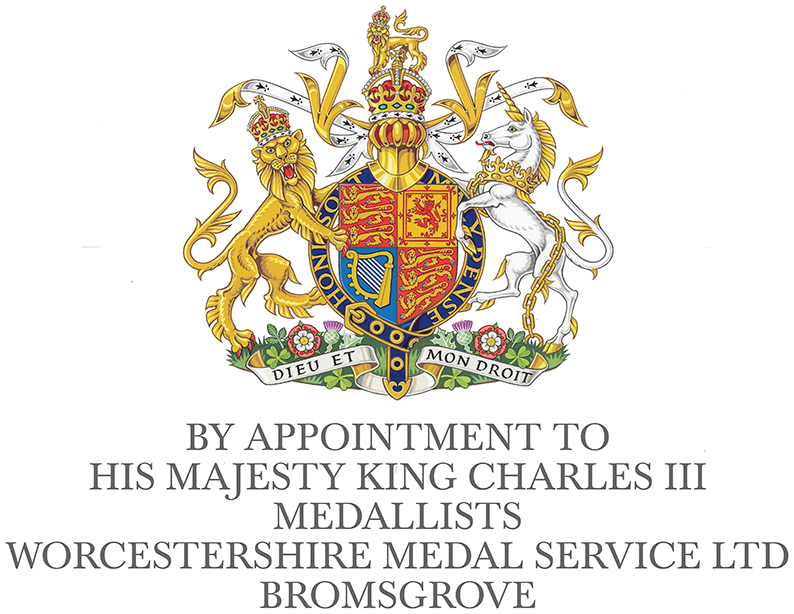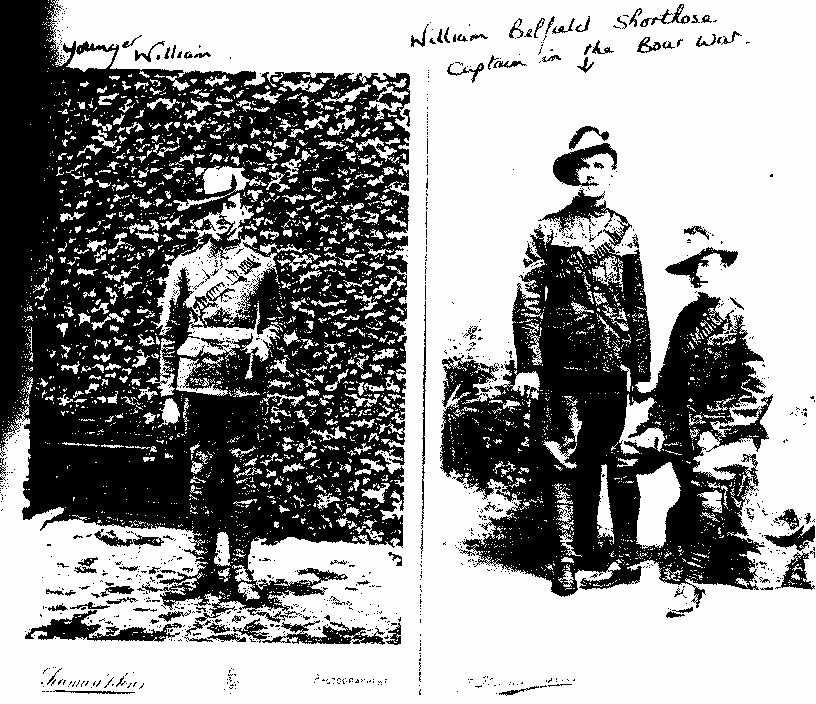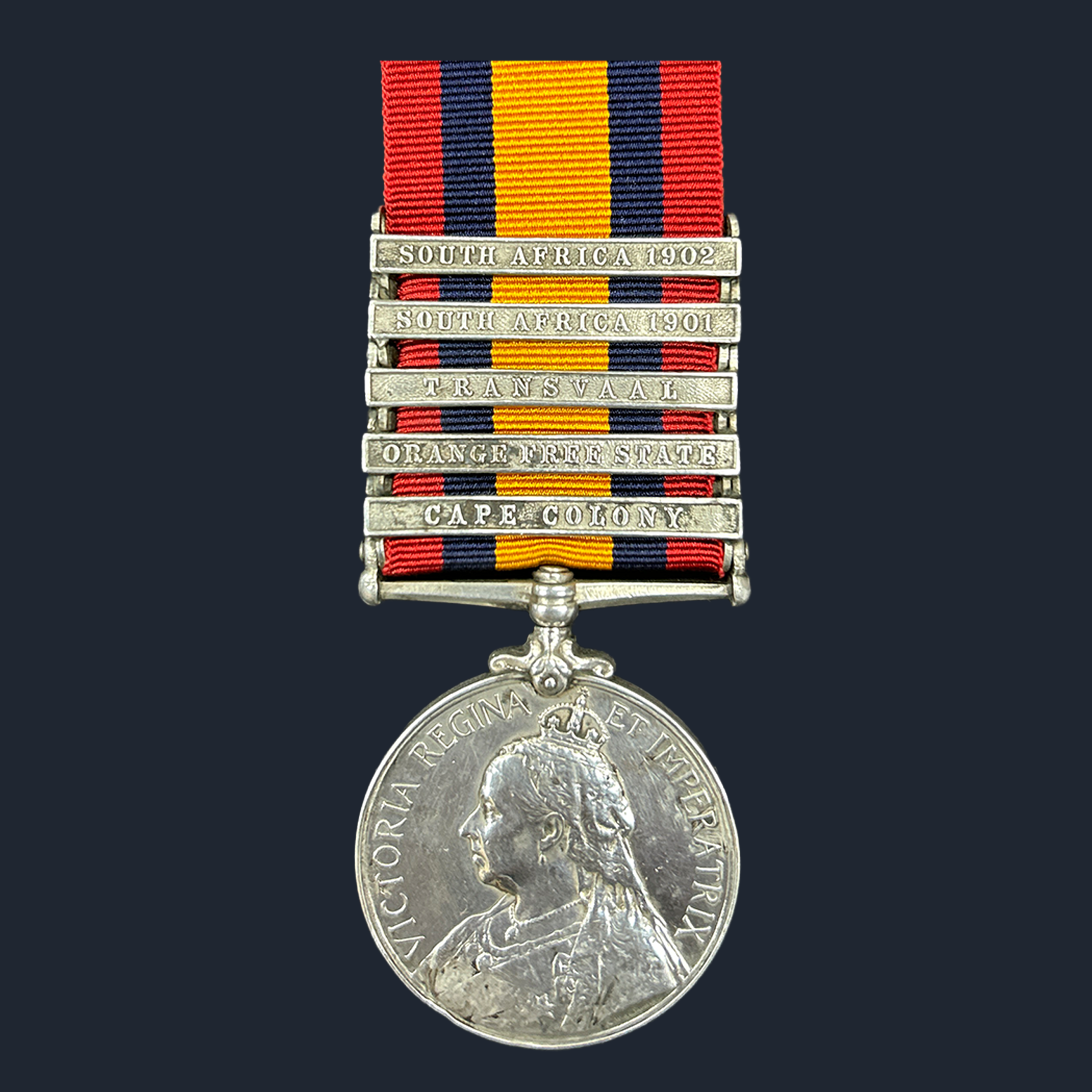Shades of Dad’s Army
Queen's South Africa Medal (Cape Colony, Orange Free State, Transvaal, South Africa 1901 & 1902) to 20299 CORPL:W.B.SHORTHOSE. 12TH COY IMP. YEO.
William Belfield Shorthose
Trooper, 12th (South Notts) Company; 3rd Battalion Imperial Yeomanry – Anglo Boer War
William Shorthose was born in Cotmanhay, Derbyshire on 5 July 1878 the son of Catherine Shorthose (born East) and her husband Joseph Belfield Shorthose, a well-to-do Timber and Coal Merchant and Colliery proprietor by profession.
Our first glimpse of a young Shorthose comes courtesy of the 1881 England census where we find him, aged 2, at home in Church Street, Ilkeston, Derbyshire, along with his parents and a multitude of siblings in the forms of John Robert (12), Henry (11), Joseph (9) and Annie (1). Mrs Shorthose would appear to have taken a break from childbirth after Joseph was born, recommencing production with the arrival of William seven years later.
At the time of the 1891 England census, the Shorthose family were still in Church Street, Ilkeston but, with the introduction of street numbering, we are able to say that they lived at No. 4. Life was little changed, save for the normal ebb and flow of children in and out of the house. John Robert had flown the coop leaving Henry and Joseph to assist their father in the business. William, the subject of this work, was 12 and still, as things should be, a School boy. Annie no longer brought up the rear, now aged 11, she had given up her place to new arrival Arthur who was 8 years of age.
As the 19th century neared its end, the power, might and influence of the British Empire knew no equal and it was thought that the sabre rattling of two inconsequential Boer Republics in South Africa, both bordering the Crown Colonies of Natal and the Cape, were of no import and, were it to come to a full-scale conflagration, the Empire would carry the day. The inevitable happened and, on 11 October 1899, Britain found herself at war with the Transvaal and the Orange Free State.
In the first few months the unthinkable happened. British reverses, in what became known as Black Week, meant that the Boers were gaining the upper hand. The British military presence of the ground, despite the aid of Colonial troops, was proving to be too thinly stretched and woefully inadequate in number to counter the Boer menace. An urgent call went out for help which led to the raising of an Imperial Yeomanry, from among the civilian population, to bolster the numbers. The reaction from the public was immediate, men from all walks of life put up their hand and rushed to the recruiting centres to enlist.
One such was William Shorthose. Having finished his schooling, he had joined his father in the family business and was, when he completed attestation forms for the Imperial Yeomanry at Nottingham on 21 January 1901, a Coal Merchant by occupation. Aged 22 years and 6 months, he confirmed that he was a serving member of the 1/3rd Sherwood Foresters – a Militia Battalion. Physically, at 6 foot in height, he was a tall man by Victorian standards where the average height of a Regular Army recruit was 5 foot 4 inches. Weighing in at 168 lbs he had a dark complexion, grey eyes and brown hair and was a member of the Church of England. by way of distinguishing marks about his person he had a scar on his forehead and his front left wrist.
Having been passed Fit by the Doctor he was assigned no. 20299 and became the newest recruit for the South Nottingham Hussars (as the 12th Company, 3rd Battalion were known). After a short 19 days at home, all that time would allow, for training and kit issue, he was ready to go to the front, the Sheffield Daily Telegraph, Monday, 28th January 1901 reporting, under the banner “ILKESTON MEN FOR ACTIVE SERVICE”, that ....Five young men leave Ilkeston to-day for Aldershot, having volunteered for the Imperial Yeomanry, for service in South Africa. Their names are William Shorthose, Pilkington (2), H. Northwood, and L. Watson. The two last-named are members of the South Notts Hussars, and Shorthose belongs to the Ilkeston Company of the 1st Derbyshire Volunteers.
Arriving in South Africa in February 1901, the men of the 12th Company were sent to the front and were soon heavily involved in the hunt for General De Wet. Altogether Shorthose was to spend 1 year and 137 days under the blazing African sun - service which took him and the fight from the Cape to the Orange Free State and into the Transvaal as the guerilla phase of the Boer War evolved. On 26 June 1902 he was returned to England and, after a period of 45 days, was discharged from the Yeomanry at Shorncliffe on 9 August 1902 with a Conduct and Character rating of Very Good.
Despite being out of uniform and with the war over, Shorthose continued on with his Militia involvement. The Derby Daily Telegraph, Monday, 21st March 1904, reporting that, “6420 Private W. B. Shorthose, of M Company, 1st Volunteer Battalion, the Sherwood Foresters (Nottinghamshire and Derbyshire Regiment) was promoted to Lance Corporal, in the Battalion Orders, Saturday 19th March 1904.”
In addition, the Derby Daily Telegraph, Monday 5th September 1904, reported that “W. B. Shorthose was a member of the Ilkeston Volunteer and Civilian Rifle Club.”
But it wasn’t always military-style matters with which he was engaged. There was now also time for romance and, on 27 February 1905, he wed Elizabeth Ann Beardsley in Ilkeston. The 1911 England census revealed that he had taken up the occupation of Grocer and Beer Retailer (for his own account) and was resident at 65 North Street, Ilkeston together with his wife, who was assisting him in the business, and his two sons, Henry (5) and Arthur (5 months).
World War I or the Great War as it became known, erupted onto the world stage on 4 August 1914 and, although Shorthose didn’t see any overseas action, he was very active in the local volunteers. The Derbyshire Advertiser of 17 November 1916 carrying the news that “Wiliam Belfield Shorthose, was to be a temporary Captain in the 1st Volunteer Battalion, Sherwood Foresters.”
As time went on he continued in the Beer trade. In 1926 he was a Licenced Victualler and owner of the Stanhope Arms in Stanton by Dale, Ilkeston, Derbyshire. His fortunes seemed to fluctuate and, when he passed away in Ilkeston on 17 January 1939 from a Heart Attack, family lore maintained that this was from the stress occasioned by making lots of bad investments.
The Nottingham Journal of 26 January 1939 carried the news that “The death of Mr William Belfield Shorthose took place suddenly yesterday at his home, 35 North Street, Ilkeston. He was 60 and an off-licence holder. He served in the South Africa War and was Commanding Officer of the Home Guards which was formed in Ilkeston at the outbreak of the Great War.”
Perhaps William Belfield Shorthose will best be remembered as one of the original members of Dad’s Army.


